|
|
|
Sort Order |
|
|
|
Items / Page
|
|
|
|
|
|
|
| Srl | Item |
| 1 |
ID:
090220
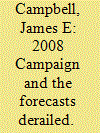

|
|
|
|
|
| Publication |
2009.
|
| Summary/Abstract |
On September 8, 2008, the Trial-heat Forecasting Model predicted that in-party candidate Senator John McCain would receive 52.7% of the national two-party popular presidential vote. The forecast of a victory of modest proportions for Senator McCain reflected his having a five-percentage-point lead over Senator Barack Obama in Gallup's early September, post-convention poll (49% to 44%) and the Bureau of Economic Analysis' August report of a 3.3% GDP growth rate in the second quarter of the year, about average for a second quarter election year economy.
|
|
|
|
|
|
|
|
|
|
|
|
|
|
|
|
| 2 |
ID:
090219
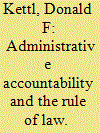

|
|
|
|
|
| Publication |
2009.
|
| Summary/Abstract |
In June 2008, the U.S. Food and Drug Administration rocked the food industry-and food lovers-with its warning about tainted tomatoes. Consumers in New Mexico and Texas were contracting a rare, sometimes fatal strain of salmonella and the FDA feared that salmonella contamination from tomatoes was the cause. In the weeks that followed, a major outbreak spread across the country and worried consumers abandoned tomatoes. Fourth of July cookouts were not the same, and BLT lovers complained that their favorite sandwich was impossibly dry. By the end of July, the outbreak had infected more than 1,200 persons in 42 states.
|
|
|
|
|
|
|
|
|
|
|
|
|
|
|
|
| 3 |
ID:
090218
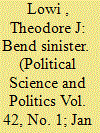

|
|
|
|
|
| Publication |
2009.
|
| Summary/Abstract |
In the construction of a state, Legitimacy is everything and nothing. Students of the state have taken a wrong turn by following Max Weber's formulation of the ideal typical state as "a human community that (successfully) claims the monopoly of the legitimate use of physical force within a given territory "(Gerth and Mills 1946, 78) Although an ideal type can be helpful, the concept can be frozen as an absolute.
|
|
|
|
|
|
|
|
|
|
|
|
|
|
|
|
| 4 |
ID:
090236


|
|
|
|
|
| Publication |
2009.
|
| Summary/Abstract |
This article explores how results from Iowa may affect outcomes in subsequent nomination contests. We suggest that how Iowa matters may be determined, at least in part, by how voters and the news media assess whether or not candidates meet or exceed expectations there.
|
|
|
|
|
|
|
|
|
|
|
|
|
|
|
|
| 5 |
ID:
090255


|
|
|
|
|
| Publication |
2009.
|
| Summary/Abstract |
I spent the spring and summer of 2007 reading 185 books in the field of international relations, as I chaired two major book awards in the field.
|
|
|
|
|
|
|
|
|
|
|
|
|
|
|
|
| 6 |
ID:
090260


|
|
|
|
|
| Publication |
2009.
|
| Summary/Abstract |
This article illustrates the profound learning that occurs-for students and instructor alike-when a class on third-world development attempts to undertake foreign aid. With undergraduate, graduate, and departmental money, I purchased bulls and carts for farmers, and goats for widows, in two West African villages. Such experiential learning personalized for students the study of micropolitics under conditions of poverty, the development of organizational structure, and north-south dependency.
|
|
|
|
|
|
|
|
|
|
|
|
|
|
|
|
| 7 |
ID:
090251
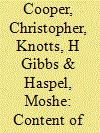

|
|
|
|
|
| Publication |
2009.
|
| Summary/Abstract |
Letters to the editor are an important but poorly understood form of voluntary political participation. To learn more about the content of letters to the editor and the characteristics of the people who write them we conducted a content analysis of 1,415 randomly selected printed letters from eight newspapers from 2002 to 2005. We also matched the letter writers from our sample to demographic and political information contained in a state voterfile.
|
|
|
|
|
|
|
|
|
|
|
|
|
|
|
|
| 8 |
ID:
090259
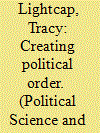

|
|
|
|
|
| Publication |
2009.
|
| Summary/Abstract |
Surveys indicate that there is more interest today in politics among college students than has been the case in the recent past. This article describes a multidisciplinary freshman seminar aimed at using that interest to promote student engagement and the Reacting to the Past simulations at the course's center.
|
|
|
|
|
|
|
|
|
|
|
|
|
|
|
|
| 9 |
ID:
090245


|
|
|
|
|
| Publication |
2009.
|
| Summary/Abstract |
"It is beyond cavil that 'voting is of the most fundamental significance under our constitutional structure'" (Burdick v. Takushi 1992, 433). Voting is particularly foundational "since the right to exercise the franchise in a free and unimpaired manner is preservative of other basic civil and political rights" (Harper v. Virginia Bd. of Educ. 1966, 667). As Justice Kennedy dissented in Burdick (1992, 434), even depriving one voter of the exercise of the fundamental right to vote is too substantial an impact to withstand constitutional scrutiny.
|
|
|
|
|
|
|
|
|
|
|
|
|
|
|
|
| 10 |
ID:
090247


|
|
|
|
|
| Publication |
2009.
|
| Summary/Abstract |
On January 8, 2008, the United States Supreme Court heard arguments in Crawford v. Marion County Election Board, a case related to the discriminatory effects of voter-identification laws in the state of Indiana. Indiana has one of the most stringent voting requirements in the nation, as voters are required to present an up-to-date photo identification issued by the federal or state government in order to cast a ballot. Plaintiffs argued that the Indiana requirements prevent significant and unequal obstacles to the right to vote. The state argued that Indiana had the right to enforce strict requirements to prevent fraud and uphold confidence in the electoral process. Similar laws have also been proposed in many other states, typically related to charges of vote fraud, and often times tied into the divisive debate regarding undocumented immigrants or African American felons. Therefore the recent decision of the Court has tremendous implications to the future of photo-identification laws across the United States.
|
|
|
|
|
|
|
|
|
|
|
|
|
|
|
|
| 11 |
ID:
090250
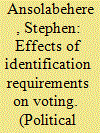

|
|
|
|
|
| Publication |
2009.
|
| Summary/Abstract |
At the heart of the efforts to improve elections in the United States are two important values: access and integrity. To guarantee the right to vote, the polls must be accessible to all who wish to vote. To guarantee legitimate elections, only eligible people should be allowed to vote, and all votes must be tabulated correctly. These values have different implications for administrative procedures, ranging from the implementation of registration systems to the choice of voting equipment to the set up of polling places and training of poll workers. Often these values work hand in hand, but at times they are at odds. Such is the case with the authentication of voters at the polls (see National Commission on Federal Election Reform 2002).
|
|
|
|
|
|
|
|
|
|
|
|
|
|
|
|
| 12 |
ID:
090249
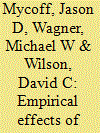

|
|
|
|
|
| Publication |
2009.
|
| Summary/Abstract |
The effect of voter-identification (voter-ID) laws on turnout is a hot-button issue in contemporary American politics. In April of 2008, the U.S. Supreme Court affirmed Indiana's voter-ID law, the nation's most rigorous, which requires voters to arrive at the polls with a state-issued photo ID containing an expiration date (Crawford v. Marion County 2008). In a famous incident highlighting how Hoosiers were dealing with their state's voter-ID law, representative Julia Carson (D-IN) was initially blocked from voting during Indiana's 2006 primary election for failing to comply with Indiana's voter-identification standard. Carson identified herself with her congressional ID card; since that card did not include an expiration date and therefore did not meet Indiana's voter-identification law, she was turned away at the polls before later being allowed to vote (Goldstein 2006). The rising wave of public, political, and legal debate crested two years later in the wake of the Supreme Court ruling and during the Indiana primaries, with reports of a dozen nuns being denied ballots at the polls due to their lack of appropriate identification (Urbina 2008).
|
|
|
|
|
|
|
|
|
|
|
|
|
|
|
|
| 13 |
ID:
090253
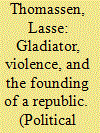

|
|
|
|
|
| Publication |
2009.
|
| Summary/Abstract |
Ridley Scott's 2000 film Gladiator presents a view of the transition from dictatorship to the republic that one also finds in the discourses of certain political leaders today. I argue that we can learn about violence and the founding of a republic from an analysis and, especially, a critique of Gladiator.
|
|
|
|
|
|
|
|
|
|
|
|
|
|
|
|
| 14 |
ID:
090243


|
|
|
|
|
| Publication |
2009.
|
| Summary/Abstract |
The issue before the U.S. Supreme Court in the Crawford case (Crawford v. Marion County Election Bd. 2008) was whether a law (Indiana Senate Enrolled Act No. 483) passed by the Indiana legislature requiring most voters to show a photo ID in order to cast a ballot violates the First and Fourteenth Amendments. Plaintiffs argued that it works an unfair hardship on many people who do not have the government-issued documents that count as a legitimate ID (Indiana Democratic Party et al., 12-16). They argued that the law, in effect, constitutes a poll tax, inasmuch as there are costs to obtain the right kind of photo ID, costs that unduly burden many eligible citizens wanting to exercise their right to vote.
|
|
|
|
|
|
|
|
|
|
|
|
|
|
|
|
| 15 |
ID:
090239


|
|
|
|
|
| Publication |
2009.
|
| Summary/Abstract |
In a book published four years ago, Andrew Busch and I divided proposals to reform the presidential nomination process into two categories, which we called comprehensive and incremental (see Mayer and Busch 2004, chapter 5). Like any attempt to classify a complex reality, this distinction blurs a bit at the edges, but the basic idea should be clear. Comprehensive proposals call for major, far-reaching changes in the basic operations of the presidential nomination process; incremental proposals make more limited, marginal changes in the rules, while retaining the fundamental structure of the existing system.
|
|
|
|
|
|
|
|
|
|
|
|
|
|
|
|
| 16 |
ID:
090261
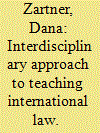

|
|
|
|
|
| Publication |
2009.
|
| Summary/Abstract |
As the world has grown more interconnected, many political science programs have added courses on international law, international organizations, the laws of war and peace, international human rights, and comparative judicial politics. While in many cases these are relatively new offerings within international studies, all of these subjects have long been part of the law school curriculum. There is, therefore, a long pedagogical history to be examined in terms of the techniques and content used in law schools to teach these courses. This paper examines a number of these techniques and discusses how they may be used in political science courses to enhance student learning opportunities.
|
|
|
|
|
|
|
|
|
|
|
|
|
|
|
|
| 17 |
ID:
090230
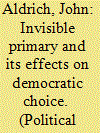

|
|
|
|
|
| Publication |
2009.
|
| Summary/Abstract |
The current method for selecting presidential nominees by the two major parties went into place mostly in 1972 and certainly by 1976, after Buckely v. Valeo. It was the natural culmination of reform efforts over the history of the republic in that, while prior reforms consistently invoked greater openness and democratic governance as rationales for their adoption, this method actually empowered voters as the central figures in determining who would be nominated (see Aldrich 1987). This fact became fully evident almost at once. The selection via primaries of senator George McGovern in 1972 and governor Jimmy Carter in 1976 as the Democratic presidential nominees arguably not only would not have happened, they would not have even come close to winning nomination without successful appeal to the voting public.
|
|
|
|
|
|
|
|
|
|
|
|
|
|
|
|
| 18 |
ID:
090235
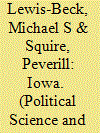

|
|
|
|
|
| Publication |
2009.
|
| Summary/Abstract |
There are perhaps many good arguments for Iowa maintaining its "first in the nation" status, in terms of the presidential nomination process. The strongest, however, would seem to be an argument that it is representative of the nation as a whole. That is, somehow, Iowa is a microcosm of the national political forces, faithfully mirroring the relevant electoral structures and choices of the macro-stage. This belief is certainly held by some. Palo Alto County, in northwestern Iowa, has long been considered a presidential bellwether, faithfully voting with the winning candidate in a series beginning in 1916. But as media worthy as that fact might be, it seems most likely a product of chance, for its heavily rural, northern European-descended population make it far from demographically representative of contemporary America (Lewis-Beck and Rice 1992, 4-6). A similar charge is commonly made today against the state as a whole, by political commentators across the land. But is it true? Is Iowa really unrepresentative? That is the question we seek to answer.
|
|
|
|
|
|
|
|
|
|
|
|
|
|
|
|
| 19 |
ID:
090244


|
|
|
|
|
| Publication |
2009.
|
| Summary/Abstract |
Following the 2004 elections Republicans assumed ascendancy in Indiana, capturing the governorship for the first time in 16 years, retaining control of the Senate and regaining control of the Indiana House of Representatives after eight years in political exile. This political development set the stage for the passage in April 2005 of the Indiana photo-ID law, also known as Senate Enrolled Act 483 (SEA), on a straight party-line vote. Two days after SEA 483 was signed into law by governor Mitch Daniels the Indiana Democratic Party (IDP) filed suit in federal district court in Indianapolis (IDP v. Rokita 2006). The case was assigned in a blind draw to U.S. district judge Sarah Evans Barker, an appointee of President Reagan and a former U.S. attorney. The same day the Indiana chapter of the ACLU filed an action in Marion Superior Court, Crawford v. Marion County Election Board. The Indiana attorney general intervened in both cases to defend the law's constitutionality and removed Crawford to federal court, where it was immediately consolidated with Rokita.
|
|
|
|
|
|
|
|
|
|
|
|
|
|
|
|
| 20 |
ID:
090256


|
|
|
|
|
| Publication |
2009.
|
| Summary/Abstract |
Human rights issues are closely connected to a range of political processes, from democracy and conflict resolution to judicial accountability and terrorism. Despite the dramatic growth of the human rights field in recent years, however, it remains unclear how much the subject has influenced political science scholarship. I assess this question by examining broad publishing trends, namely human rights articles in the discipline's leading journals.
|
|
|
|
|
|
|
|
|
|
|
|
|
|
|
|
|
|
|
|
|